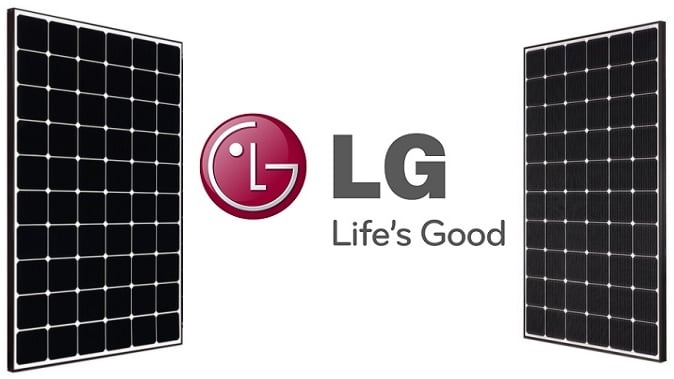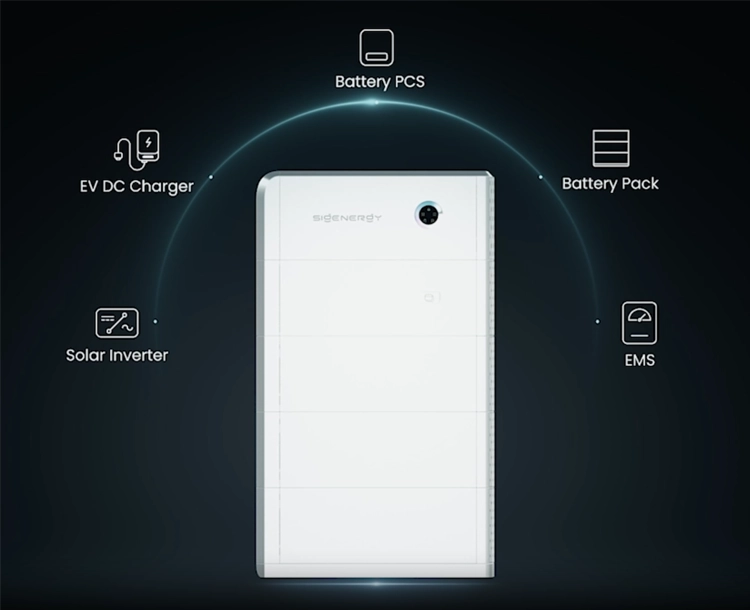LG Solar Panels – Neon Product Review
- Logan Haggerston

A Complete Review of LG Solar Panels for Commercial & Home Solar Systems
LG is among the leading manufacturers of high-quality, tier-1 solar panels. LG solar panels boast high-efficiency ratings and an unrivalled 25-year warranty. Currently, the company offers two ranges of solar panels, the NeON and Mono X.
The NeON series consists of models like the NeON 2, NeON H, and NeON R. The Mono series has the entry-level Mono X Plus. HCB Solar’s recommended panel is the NeON 2 solar panel, as it provides the best in both performance and price. But are these panels worth your investment?
Some of the vital things to check when buying a solar system include the warranty, performance, efficiency, and price. We detail every aspect in this LG solar panels review.
About LG
LG is a reputable South Korean company that has a market capitalization of approximately $27 billion. The company has interests in many sectors like electronics, chemicals, and communication.
The company made its entry into the solar panel business in 2009, and since then, it has established itself as a premium solar panel manufacturer. LG Solar is responsible for producing durable, aesthetically appealing PV modules. Thanks to advanced cell efficiency and technology, LG panels are popular worldwide. In Australia, LG Solar has offices in almost every state capital.

Cell Technology
The production of LG solar modules adheres to Cello Technology. This technology involves making cell connections with electrically low loss, low stress, and enhanced optical absorption. LG uses EL flash tests to eliminate defective cells in the production stage.
LG makes its NeON panels using monocrystalline N-type cells. These cells have higher efficiency and lower degradation levels. With that said, the entry-level Mono X Plus relies on P-type monocrystalline cells.
Most residential NeON panels contain 60-72cells, while commercial panels have 72-120 cells. High-performance modules can incorporate up to 144 cells.
The latest NeON 2 solar panels use multi-wire cell technology. These modules come with 12 round wire busbars to increase light absorption and minimize power-generation losses. What’s more, the output of NeON modules at 25 years is at an impressive 90.08%. Other brands offer panels with outputs of 80% to 85% after 25 years.
Warranty Period
When it comes to solar panel warranty, few brands rival LG.
You get a 25-year product and performance warranty if you purchase the NeON 2, R, or H series. The LG solar panels warranty is above the industry average of 10 years.
LG certainly holds its solar panels in high regard to offer such types of warranties.
In case of manufacturing defects, LG will provide spare panels. The company also covers the labour and shipping costs when replacing panels.
Not every flaw is claimable under warranty. The company won’t issue a solar panel replacement in case of improper usage.
Warranty claims are valuable when the issuing company is active. LG Solar has been in operation for many years, and nothing suggests it will go under any time soon. If you shop for solar panels based on warranty, you should consider getting LG panels.
LG Solar Panel Efficiency
Solar efficiency depicts the amount of sunlight a panel can convert to solar power. The efficiency of most solar panels ranges between 15% to 20%. High-quality panels have higher efficiencies and perform better.
The efficiency of LG panels varies, depending on the model. The standard LG panel has 18.6% efficiency, while the top NeON module has 22% efficiency. This range is suitable for many residential solar systems.
LG’s best-selling panel, the 345W NeON 2 Black Solar Panel, has 20% efficiency. Its counterpart, the 365W NeON 2, has a 21% efficiency.
Some LG NeON 2 solar panels use bifacial solar cell technology to achieve better efficiency. This technology allows these models to harness more power per square foot compared to regular solar panels.
Bifacial panels capture light reflected from beneath the panel. They, therefore, generate more energy compared to single-sided modules.
Solar Panel Performance & Quality
The N-type cells used to make NeON panels guarantee exceptional long-term performance. The high-grade, N-type cells reduce Light Induced Degradation (LID).
Degradation reduces the performance of solar panels over time. Traditional panels lose about 3% output in the first year and 0.8% in the ensuing years. When such solar modules clock 25 years, they only have approximately 80% capacity. This isn’t the case with LG Neon solar panels.
The degradation in LG cells is much slower. Most NeON series maintain a 90.08% output after 25 years.
Solar panels work well when the temperature is about 25˚C. Higher temperatures tend to decrease the panel’s electricity generation. However, LG solar modules perform relatively well in unideal conditions.
The temperature coefficient is an ideal method of monitoring the performance of a panel. A temperature coefficient of -0.5%/˚C means the panel’s electricity production will decrease by 0.5% for every one-degree temperature increase. The temperature coefficient value of a high-performing solar panel should be near 0.
LG panels have temperature coefficients that range from -0.4 to -0.3%˚C. This range is above the industry average and suits Australia’s harsh climate.

LG Solar Panel Aesthetics
LG offers some variation in its solar panels. Although black panels are appealing, LG tweaks a few panel colours. Most of its solar modules have black cells, while the back sheets are white. This colour mismatch creates visible lines between cells.
The company uses anodized aluminium to make panel frames. These frames are either silver or black. If you prefer an all-black solar panel, go for models like the NeON 2 305W Black panel.

How Much Do LG Panels Cost?
The high module efficiency of LG modules means you only require a few panels on your roof.
LG solar panels are relatively pricey. Given the company makes efficient panels, these prices are justifiable. You can expect to pay anywhere between $2.40 and $3.12 per watt for mid-range solar panels. This cost is an approximation. It could be higher or lower, depending on the installer.
Model Range in Australia
LG offers several NeON panel ranges, including:
NeON 2 Series
LG NeON 2 series tick every box for what you’ll need in a solar panel. We recommend these solar panels as they are efficient, durable, and dependable.
- Cell type: Monocrystalline, N-type cells
- Number of cells: 60 – 72 cells
- Weight: 18 kg
- Output: 350 – 370 watts
- Warranty: 25 years
Lg NeON 2 solar panels use the N-type cells and the 12-wire Cello technology. They maintain 95.03% efficiency up to the tenth year.
This output drops to 90.08% after 25 years. The slow degradation allows you to capitalize on your ROI.
If you have a small roof and need more power, Neon 2 panels will meet your needs. You only need about 18 Neon 2 panels for a 6.6kW solar system.

NeON H Series
Neon H are powerful, versatile solar panels.
- Cell type: N-type Monocrystalline
- Cell number: 120 cells
- Output: 370 – 385 watts
- Warranty: 25 years
The NeON H panels use half-cut technology to improve efficiency and output. They have enhanced temperature coefficients, meaning they deliver high outputs even in hot weather.
These panels have a 25-year product and performance warranty. At 25 years, they still have a respectable 90.6% efficiency.
NeON R Series
Neon R solar panels are the most potent and efficient modules from LG.
- Cell type: N-Type Monocrystalline
- Number of cells: 60 cells
- Output: 380 watts
- Warranty: 25 years
The Neon R series uses the 30 multi-ribbon busbar technology to increase the panel’s efficiency. Under optimal conditions, this LG panel achieves 22% efficiency. The panel’s glass uses anti-reflective glass to absorb more light. More absorbed light translates to more electricity production.
Neon R solar panels generate 15% more electricity per square meter compared to similar-sized panels. These panels still achieve 87% output after 25 years.

Key Takeaways
- LG NeON solar panels are highlighted for their high efficiency, durability, and a 25-year warranty, making them a reliable option for both home and commercial solar systems.
- The panels utilize advanced cell technology, including monocrystalline N-type cells for NeON models, enhancing performance and reducing degradation.
- LG solar panels are known for their impressive efficiency rates, ranging from standard models at 18.6% to high-efficiency NeON modules at 22%.
- The comprehensive warranty covers product and performance, ensuring replacement in case of manufacturing defects, including labor and shipping costs.
- While LG solar panels are priced higher due to their quality and efficiency, they are considered a worthwhile investment for their long-term value and reliability.
Are LG Neon Solar Panels Worth it?
Absolutely! LG solar panels can be a higher price point option for your solar system, but they are worth every dollar. They are highly efficient, extremely durable and come with an unbeatable 25 year warranty.
Still have questions about LG solar panels or your solar system? Looking for a quote? Contact HCB Solar today on (02) 4953 7732 or via our online booking form!


